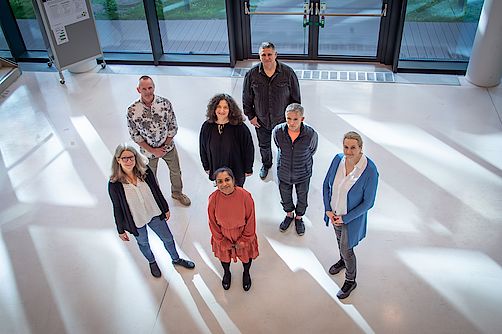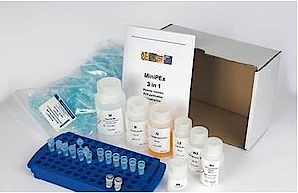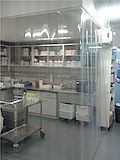
News
MonoQ
MonoQ provided by the Millipore-machines is deionized, charcoal treated and ultrafiltrated. The ultrafilter removes not only bacteria (including Mycoplasma) but also Endotoxins. Thus, it is perfectly suited for most applications in our labs.
In accordance with the Scientific Reps the following changes will take place immediately:
- In the future, the MediaLab is providing autoclaved MonoQ water only by online order in 250ml bottles. This water is the same as “Sterile, Nuclease Free Water, non-DEPC-treated” sold by e.g. Thermo Fisher for >80€/500ml.
- Large quantities (2 liter bottles) of MonoQ-Water can also be ordered online from the Media Lab. However, this water will not be autoclaved, unless you can provide a valid justification.
Please find here a summary, detailing which water should be suitable for your application, if you are uncertain, please ask your experienced colleagues:
Water | Source | Recommended applications |
Deionized (Reverse Osmosis) water | Tabs at sinks in the labs
| Filling water baths, destaining gels, electrophoresis and SDS-PAGE buffers … |
Ultrapure MilliQ water
| Millipore systems on each floor
| Biochemical reactions, assay buffers for e.g. protein chemistry, in vitro enzymatic reactions, CO2 incubators, … |
Sterile MonoQ water | MediaLab | PCR, RNA or DNA isolation, tissue culture buffers, … |
Other sources of high quality water
Ultrapure Water:
The MilliQ-systems on the floors provide ultrapure water; in fact, the same quality as the water from the MediaLab. These machines are regularly serviced (maintenance contract with Millipore, yearly maintenance), the cartridges are exchanged at least yearly or when they are exhausted. They are equipped with an ultrafilter, that retains Bacteria, Endotoxins and Nucleases. This filter is exchanged every 3 months by the FM.
Please make yourself familiar with the display of the QPod dispenser (page 51 of the manual and in the attachment). In case you notice warnings, please contact the facility management immediately! They have spare cartridges for immediate exchange. You can find the manual for the MilliQ-Systems here: https://biocenterat.sharepoint.com/sites/managementscientificservices/General%20Research/Documents/Manuals/Millipore%20Milli-Q/Milli-Q-Advantage%20A10%20User%20Manual.pdf
For IMBA, we will install three additional machines on the Plaza, first and second floor to satisfy your needs.
Recommendation: (Non-autoclaved) MonoQ water is typically used for biochemical reactions or making assay buffers (for e.g. Akta, protein chemistry, in vitro enzymatic reactions), or TC-CO2-incubators.
Deionized water:
In the labs, you can find outlets for reverse osmosis water (aka deionized water). The piping is laid out as a circulation system, thus after discarding the first few hundreds of milliliters, the quality is sufficiently good for many tasks.
Recommendation: This water is absolutely adequate for filling water baths, destaining gels and even for making electrophoresis and SDS-PAGE buffers.
New Product of the Molecular Biology Service
Dear colleagues,
Molecular Biology Service is proud to offer a cost efficient replacement for Qiagen’s MiniPrep, Gel extraction and PCR purification kits.
Our kit contains all buffers to do 250 of either of the applications mentioned above for just 130 Euro instead of a minimum of more than 300 Euro for the Qiagen kit.
From now on (July 2015), the kit will be available from the General Store (in the section containing nucleic acid purification systems).
New Gibson Mastermix, protocol and technical notes
The Gibson Assembly Master Mix we provided so far had the limitation of only 5 μl of flexible volume for the fragments. In quite some cases people had to concentrate their fragments because of this fact. Therefore we changed the formulation of the master mix to a 2x mix and thereby increased the flexible volume to 10 μl.
You will find the new protocol and additional information at our fridge in R5.55.
If you have additional information do not hesitate to ask.
- Hazard Labels
To improve the compliance with Austrian and European legislation, new labels with hazard notes are introduced. In addition to these hazard notes, you will find the production date and a QR-code linking to the manufacturing SOPs. All bottles that are heat sterilized will carry autoclave tape.
no news in this list.


